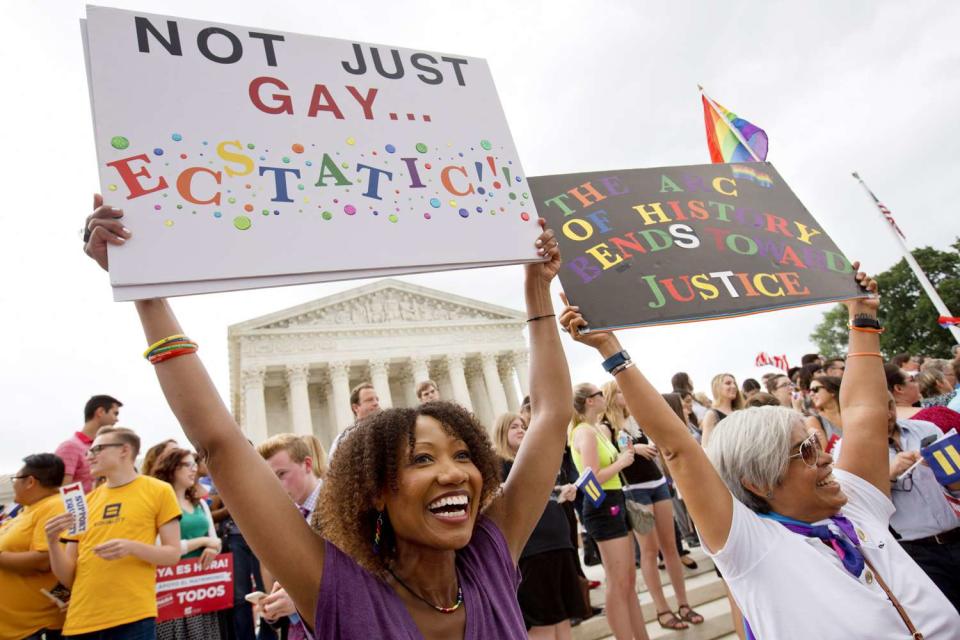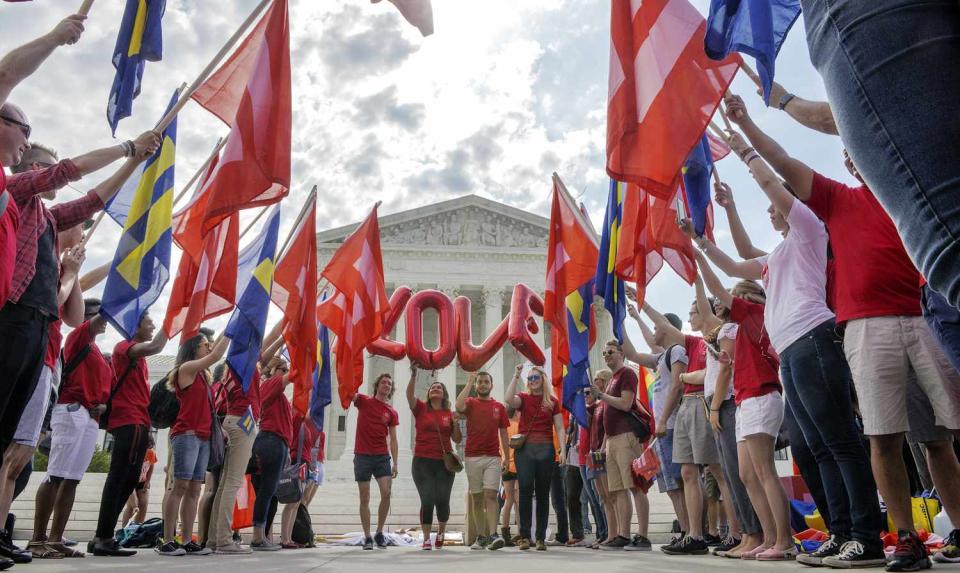What to Know About the 'Respect for Marriage Act' as D.C. Lawmakers Rush to Codify Same-Sex Marriage

AP Photo/Jacquelyn Martin
Seven years ago, tears of joy flooded the Supreme Court steps when millions of Americans were granted a basic human right long afforded to the rest of society.
Obergefell v. Hodges, a landmark civil rights case that reached the Supreme Court, legalized same-sex marriage nationwide on June 26, 2015, giving LGBTQ+ people hope that better days were ahead. For a while, it seemed that way, with lifelong couples finally able to call each other spouse and public opinion toward the queer community improving.
Then a far-right movement gained traction in federal and local governments, emboldened by Trumpist politics, and lawmakers began amplifying attacks toward marginalized groups, including the LGBTQ+ community. This year alone, state governments have drafted legislation targeting drag queens, inclusive education, gender-affirming care, trans athletes, and even parents of LGBTQ+ youth.
And on June 24, in the most significant unraveling of human rights in modern history, the heavily conservative Supreme Court overturned Roe v. Wade, eliminating pregnant people's constitutional right to abortion and paving a path to come for contraceptives and same-sex relationships next.
"The right to privacy, that's something we all deserve as human beings," Jim Obergefell, namesake plaintiff in Obergefell v. Hodges, recently told PEOPLE. "It's something that our constitution should keep sacrosanct, but [overturning Roe] takes that away."

AP Photo/Jacquelyn Martin Wives celebrate the legalization of same-sex marriage outside SCOTUS in 2015
Congress reacted to the Supreme Court's recent Roe decision by attempting to codify abortion rights at the federal level to ensure nationwide access to reproductive health care. A beginner's bill that would set them up to fully legalize abortion passed the House last week and promptly stalled in the evenly split Senate.
Now, Congress is attempting to do the same with marriage equality, this time proactively, in an attempt to get ahead of a possible Supreme Court outcome down the road.
Seventy-one percent of Americans currently support same-sex marriage — the highest percentage ever recorded — according to a recent Gallup poll. But that may not be enough to sway Republican officials.
"These decisions, this movement towards government intrusion into our bedrooms, into our doctor's offices, into our schools, everyone should be worried about that," Obergefell told PEOPLE about the dangerous position Americans are in right now.
"Can we all just treat each other as human beings deserving of the same dignity, the same respect, the same rights?"

AP Photo/John Minchillo A couple shares a triumphant and emotional hug before their marriage ceremony on June 26, 2015
The Respect for Marriage Act
Congress' fight to protect Americans' marriage rights is well underway, presented in the form of the Respect for Marriage Act, abbreviated as RFMA.
The bill aims to repeal the 1996 Defense of Marriage Act, or DOMA, which defined marriage as involving a man and woman and gave states the authority to refuse recognition of same-sex couples who had married.
The Supreme Court deemed the primary provisions of DOMA unconstitutional in its United States v. Windsor and Obergefell v. Hodges rulings. But it's still technically a law. If those Supreme Court precedents were to be overturned by the current justices, it could go back into effect.

Bill O'Leary/The Washington Post via Getty Supporters of same-sex marriage await the groundbreaking Supreme Court ruling
The Respect for Marriage Act was first introduced in 2009 and, though it passed the House and was moved to the Senate floor in 2011, the Senate vote never occurred. After Obergefell, there seemed to be no reason to continue pushing for it — until the events of this year.
RFMA was reintroduced by lawmakers on Monday with a small revision to not only codify the right to marriage for people regardless of sex, but also regardless of race, ethnicity or national origin, reaffirming the 1967 Supreme Court ruling in Loving v. Virginia, which legalized interracial marriage.
On Tuesday, the House passed RFMA in a 267-157 vote, with 47 Republican representatives joining Democrats in defending marriage equality. With 65% support, it still failed to fully reflect the 71% of Americans who support same-sex marriages, but it was enough to move the bill along.
Now, RFMA sits in Senate's hands, where Democrats will need to get 10 Republican senators to side with them in order to meet the 60-vote threshold for passage. It's a tall order, since senators are less representative of the American population and notoriously loyal to party lines.
Republican Sen. Susan Collins, who helped introduce the latest, bipartisan iteration of RFMA, shared a statement about her participation with PEOPLE, saying, "This bill is another step to promote equality, prevent discrimination, and protect the rights of all Americans."
The senator, who is known to cross party lines from time to time, says she has proudly supported legislation that prohibits discrimination based on sexual orientation and gender identity.
Never miss a story — sign up for PEOPLE's free daily newsletter to stay up-to-date on the best of what PEOPLE has to offer.
Collins' fellow co-sponsor, Democratic Sen. Tammy Baldwin, is the first openly LGBTQ+ person elected to Senate. In a statement shared with PEOPLE, she said, "We cannot allow this freedom and right to be denied," hinting at her impending fight to get Republicans on board with RFMA.
"Marriage equality is a constitutional right that has been well established by the Supreme Court as precedent, and this freedom should be protected," she said. "The bipartisan Respect for Marriage Act will enshrine and protect marriage equality and make sure legal same-sex, and interracial marriages are recognized."

